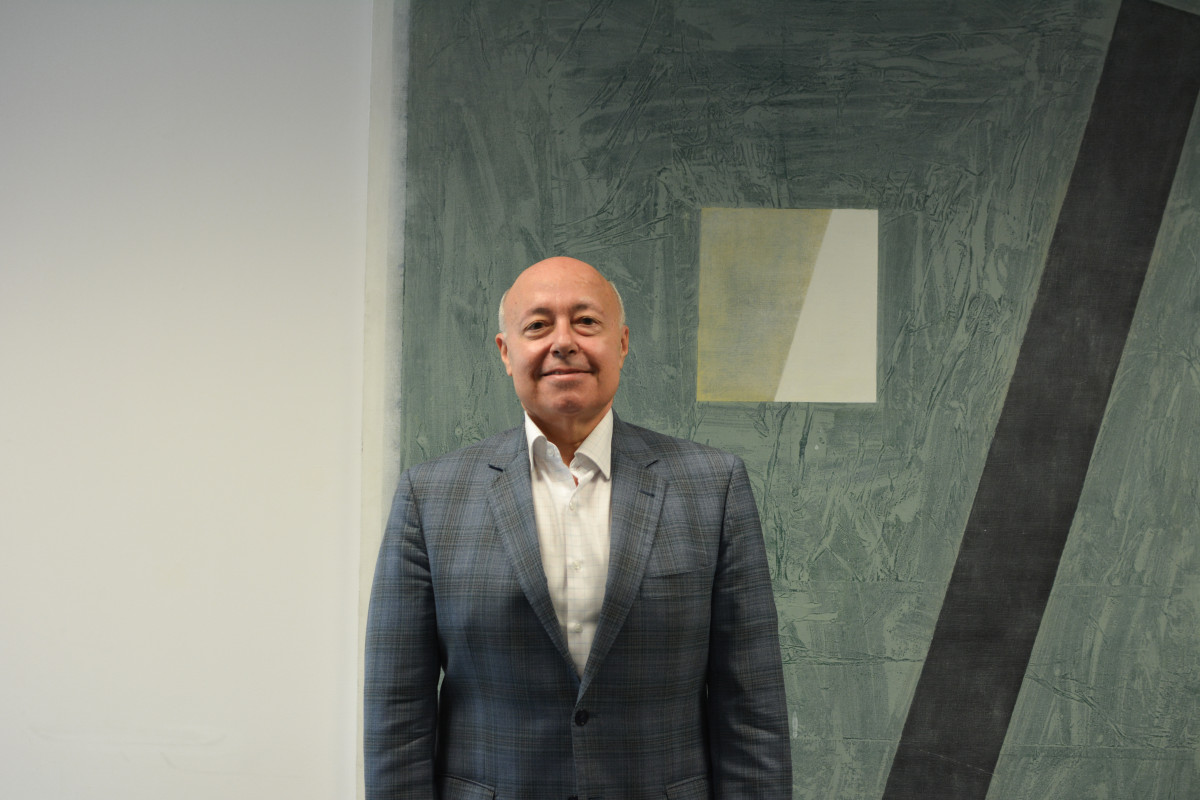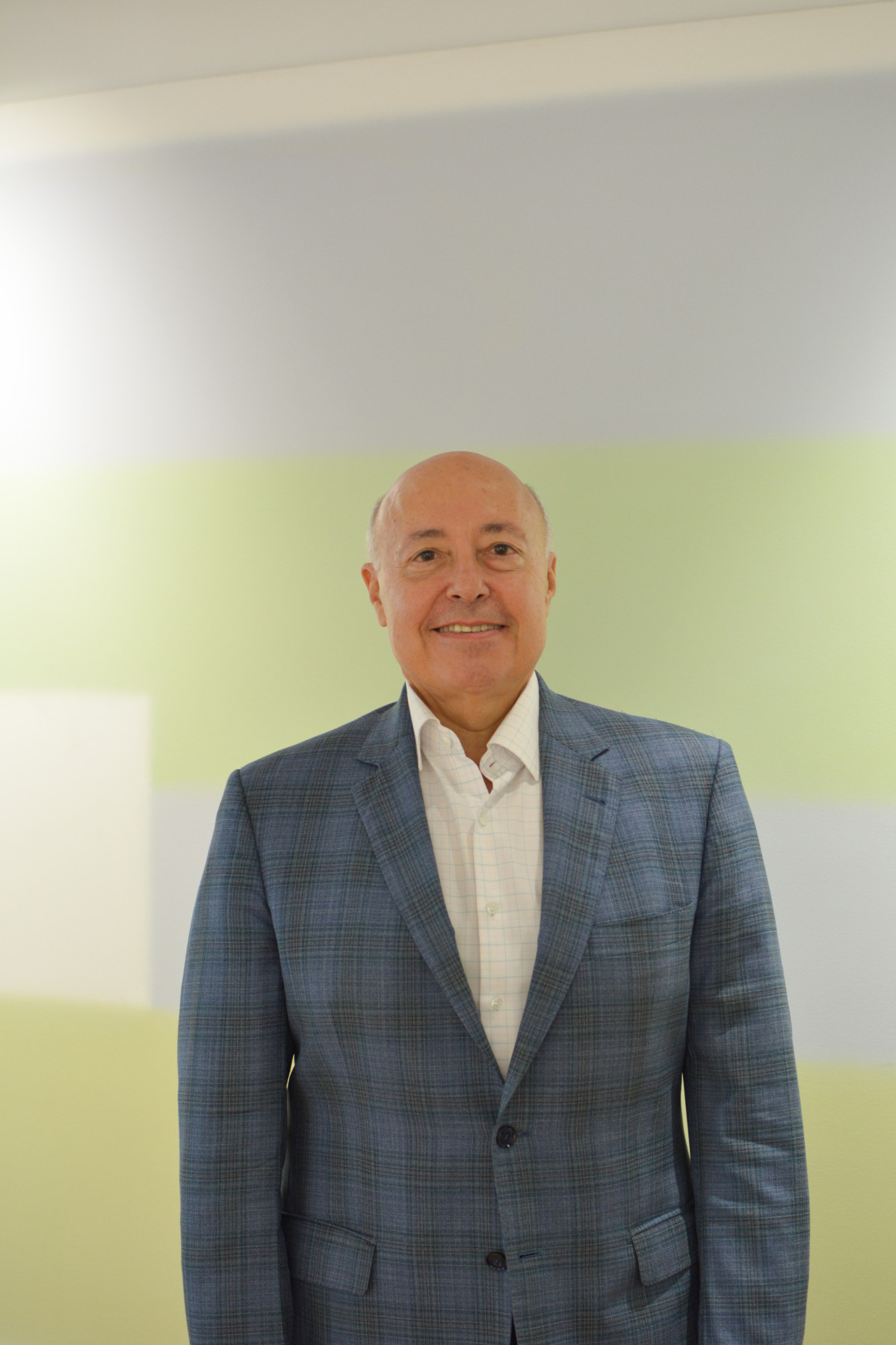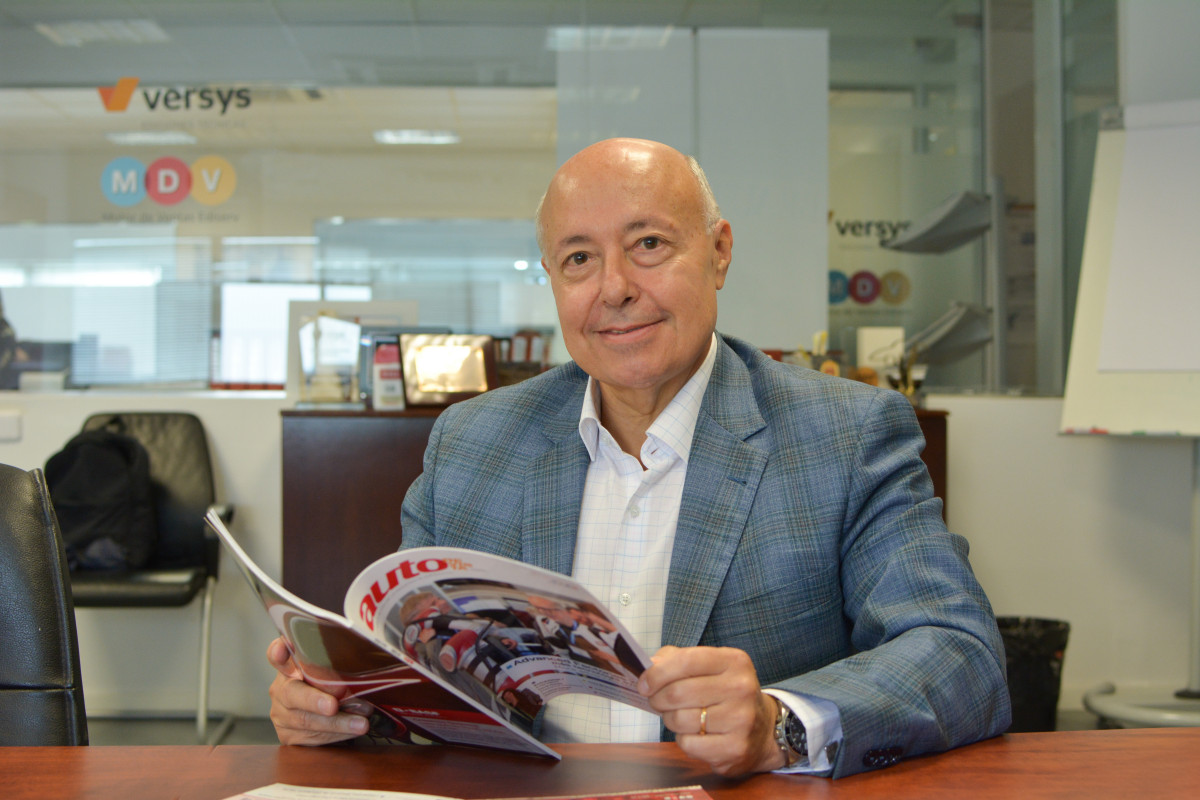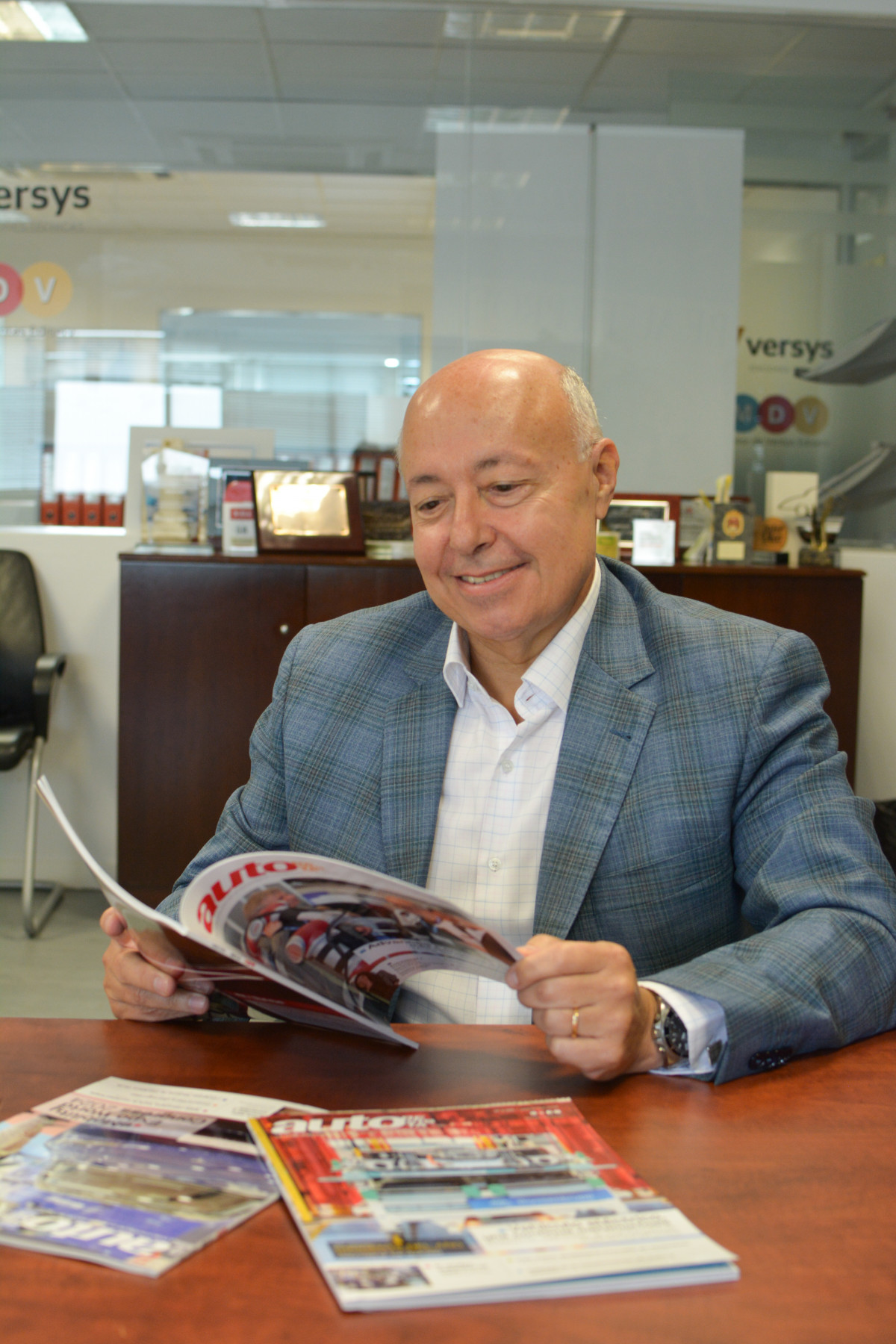Eduardo González: "‘My career can be summed up in a 360º vision of the automotive industry’”

Eduardo González has completed an irreproachable professional career, with a long and fruitful period at Continental. Currently contributing his experience and knowledge to the Corell Foundation, in this interview with AutoRevista he describes a career that has earned him the recognition of ‘Dirigente de Honor’ in the framework of the 34th Dirigente del Año Awards.
Eduardo González's wisdom and assertiveness come through in conversation with AutoRevista. Eduardo González developed his career in the automotive industry since 1985, having worked in multinational companies of German origin such as Mannesmann, Siemens and later in Continental, a company in which he assumed different positions and responsibilities until he became General Manager of the Automotive area. His career also includes his role as vice-president of SERNAUTO since 2013.
An exemplary and impeccable CV that has always kept his agenda full and organised by colour and that now, after his recent retirement, in 2024 will be cleared and gives him something as valuable as time. A time that he will continue to generously share with the automotive industry, at least to a large extent, given his current role as coordinator of the Mobility Think Tank within the Corell Foundation.
His extensive career has given him a 360º vision of the sector and, above all, of life. During the interview, González was critical of issues such as the unequal distribution of wealth. ‘We still have wars, devastation, hunger in the world... And yet we have people who are able to pay to go into space and come back’. On the other hand, he has taught us that you can always learn from anyone who contributes to you, regardless of their professional rank: ‘Whenever they have contributed to me, I have always learned. And that includes everyone, even the workers below me. Because of how they worked and how they were involved’. In short, Eduardo González is an example to follow professionally, but also personally.

AutoRevista.- How would you sum up your career in a few words?
Eduardo González.- A 360º vision of the automotive industry. Because thanks to my career I have been able to work in the areas of first team; factory, special equipment, body shops. Also in the aftermarket and everything it entails (from creating a distribution network that works with both independent distribution and official services). And finally with networking. Working in so many different scenarios has given me the opportunity to interact and learn a lot because the challenges are so different.
AR.- Let's start at the beginning. You are a telecommunications engineer, why did you decide to study engineering?
E.G.- I studied telecommunications in the 70s, in the middle of the 70s. There wasn't much technology. The first IBM personal computer arrived in about 1984. Everything was just starting and it was in this context that Telecommunications Engineering was born. I was very interested in all this and that's why I did my degree. But well, in the end, life places certain opportunities in front of you that have nothing to do with what you initially expected. I never imagined I would end up in the automotive industry. But now, 40 years later, we are seeing connected cars that have between three and five computers on average, so I guess that closes the circle. And it was unthinkable when I came into the automotive industry, because cars were just petrol and grease.

AR.- Were there many professional opportunities at that time?
E.G.- The truth is that there were, because companies were beginning to realise that they had to incorporate the new technologies that were arriving and, to do so, it was necessary to recruit professionals with knowledge related to computers. And that is precisely how I arrived in the automotive sector.
AR.- What was that arrival like?
E.G.- I came across a job offer, I did the interview and they offered me the opportunity. It was in the international German group Mannesmann. At first I was a bit sceptical, but I decided to give it a try. Moreover, this company had both automotive components and computer manufacturing divisions. So it was a technology-driven company. In fact, it was a competitor of IBM. And those computers were previously only available to state-owned companies, hospitals or the administration... Because they were the first to start managing data at that time. In short, having that technology was a privilege.
AR.- You went in sceptical, but smiles when he tells the story. How does he remember that time?
E.G.- Of course, because now it's completely normal to get into your car, greet him and have him say good morning, but before that it sounded like science fiction. I remember it with a lot of affection and nostalgia, because I made the decision to embrace an opportunity in the automotive industry, and it was a good decision. Luck was with me. Of course you have to work very hard afterwards, but luck must also be on your side.
AR: What about Siemens?
E.G.- Vodafone made a takeover bid for Mannesmann, it went ahead and acquired the company. But it was only interested in the telephony division and sold the industrial part. The German government then mediated with large groups in the country to retain the business and different companies decided to buy it. Among them were Siemens, Bosch and ZF, that took over the industrial part of Mannesmann that they were interested in to complement their business. Siemens had an automotive part and from 2021 we became part of the we started to be part of the company family as a group called Siemens VDO, which brought together everything from Siemens related to automotive and Mannesmann. Kienzle. And I was there from 2001 until 2008, when Continental acquired the automotive part of Siemens and, with that, a huge which created a very large automotive group at a global level. So much so Continental was in the top three in the market, together with Denso, Bosch and ZF.
AR.- So you never left the company you joined. Your career has been impeccable.
E.G.- Yes, although if you look at my working life, there are at least ten legal entities, plus three large groups. Although it is true that they all belong to the sector. But yes, you could say that I haven't really left, only that the changes are complex and I've been able to survive them... But, in the end, my work has been recognised and I feel satisfied that I have been able to maintain myself and adapt, and also that I have not affected those people who have placed their trust in me.
AR.- Let's talk about Continental. You have carried out tasks in both the technical and commercial areas. The technical area, given your training and trajectory until then, seems natural, but the commercial area, not so much... How did you come to carry out this type of tasks?
E.G.- It is true that the development in the company was very much oriented towards the technical area, but from the very first moment there was contact with clients. And contact with people is something I have never disliked, just like communication. So those who were in charge of me saw that I also had that aspect, not so much oriented towards commercial activity as towards dealing with and relating to customers. To understand what their problems are, what their needs are and, of course, to try in some way to ensure that our organisation can satisfy those needs in the right way. It is interesting to understand that you can't work the same way in the original equipment field, (when you are fighting to get a component of yours to be part of a vehicle) as you do with the aftermarket distribution. Because with the aftermarket you have to work with constraints such as price, competition or deliveries, because in this case you have to modulate the customer's expectations and become his partner.
AR.- You became General Manager of Continental at the age of 37, a new turning point in your career. How do you remember that change?
E.G.-. It was a complex period, because in this context, every day we had to produce, sell spare parts and look for new projects. In the end, results are measured by objectives, and we have to invoice and have a result. It was complicated, but, with a lot of effort, my team and I managed to do it.
AR.- And what happened when you took over responsibility for the Rubi plant?
E.G.- It was in 2006 and lasted until 2008. It was a great experience. In 2008. When we had just arrived at Continental, there was a restructuring of responsibilities, and then I became responsible for the aftermarket. And the truth is that it was fantastic because I continued at Continental with new products and new lines. And from then until now, until my retirement in 2024.

AR.- How did you experience the pandemic?
E.G.- The pandemic is the icing on the cake. In 2020 I already felt I was at the end of my professional career. I had already set a departure date and it was time to enjoy what I had achieved and to make way for other people in the team. And suddenly, when I was calmer, I found myself in a situation that was impossible to foresee. And no matter how much preparation one has or how many years one has worked, we were faced with a new, completely different reality. But I think that's where the best of each of us showed itself. We saw it within our organisation, in the people who worked in it, but also in the sector's environment, the associations... We all set to work to make it happen. We put in the hours at home, because we could, and that meant that there was no discontinuity and that our plants could continue working so that there would be no shortage of supplies. In short, Covid for me showed the best of our teams.
AR.- You were part of SERNAUTO, even taking over the vice-presidency. What was that experience like?
E.G.- It's another chapter. One thing leads to another. I joined in 2006 and experienced many things, including an internal review of the association. We realised that we had to increase visibility. Because a lot of things were being done, but if you don't count them, your level of influence is reduced. That's why this whole internal review process was very interesting, including a statutory change and my promotion to vice-president, which allowed me, together with other people, to contribute to changes in the organisation, such as expanding the team or improving relations with other associations.
AR.- You have just retired recently but you have not left the sector, because you are leading the Corell Foundation's Think Thank on Mobility. How is this experience going?

E.G.- On 30 June, yes, I'm still getting used to the idea. This is another aspect, related to the industrial vehicle. Continental started working as a patron, through an economic contribution, and now that I am not part of the patronage part because I am not at Continental, they proposed that I lead the Think Thank. It was quite organic. This foundation proposes to carry out studies, make the problems of this type of transport visible and offer solutions. Specifically, we work on the basis of three pillars: environmental, social and economic. We are working with them on the Think Thank. I hope to contribute a lot and I will do everything I can to make this happen.
AR.- We have reached the end of this interview. Which people have left their mark on you during your time in the sector?
E.G.- It's complicated, because whenever you can nominate someone you leave out others and it's like detracting. But, well, I have learned from many people. For example, Antonio Sánchez Burgos, the general manager who hired me. He was a person who combined his activity in the banking area with being the main shareholder of the company. He taught me about hard work and effort. On the other hand, in the world of Mannesmann VDO, I was influenced by another person who was responsible for our business worldwide, Paul Harvey, an Australian who was first in South Africa before moving to the head office in Germany.. He taught me what it is like to adapt to other countries, and to work in a multicultural environment. On the other hand, in the last few years, all those with whom I have had a relationship and who have contributed to me. Whenever they contributed to me, I learned. And that includes everyone, also employees who were under my responsibility, because of how they worked and how they were involved.
Lea esta entrevista en castellano

La Asociación Nacional de Fabricantes de Automóviles y Camiones, ANFAC, ha presentado, en la mañana del 10 de julio, su Informe Anual.

Profesionales del primer nivel de las empresas de la industria de automoción y movilidad se han congregado en una jornada organizada por CEAGA en Vigo para ofrecer a los líderes del sector una visión práctica y multidisciplinar que les permita anticiparse y responder eficazmente a los desafíos del entorno.

SERNAUTO ha publicado su memoria de Sostenibilidad 2024, en formato Informe Integrado, que constituye un análisis exhaustivo de la actividad, aportación de valor y papel activo de la entidad como portavoz del sector.

La planta de Stellantis en Melfi (Italia), se equipará con la nueva tecnología PixelPaint de ABB con pintura monocapa de Nippon Paint para crear la pintura bitono del nuevo buque insignia, el N°8 de DS Automobiles.

El fabricante francés anuncia el modelo que se fabricará en Curitiba (Brasil) y Bursa (Turquía).
